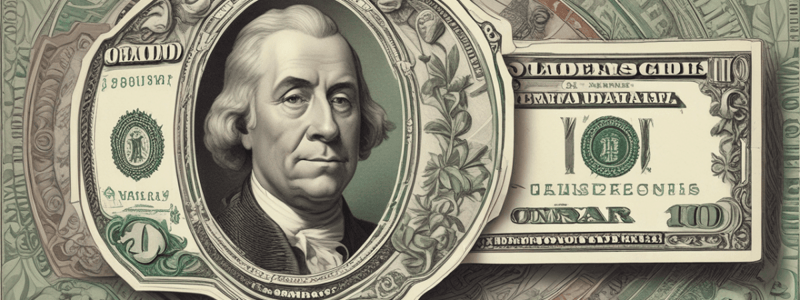Podcast
Questions and Answers
What is the primary goal of central banks when adjusting interest rates to control the rate of inflation?
What is the primary goal of central banks when adjusting interest rates to control the rate of inflation?
- To increase the cost of credit and stimulate economic activity
- To decrease the cost of credit and reduce demand
- To decrease savings and increase consumption
- To influence economic activity and hence the rate of inflation (correct)
What would a central bank do to discourage borrowing and reduce inflation?
What would a central bank do to discourage borrowing and reduce inflation?
- Increase the reserve ratio
- Implement quantitative easing
- Increase the key interest rate (correct)
- Decrease the key interest rate
What is the effect of quantitative easing on the economy?
What is the effect of quantitative easing on the economy?
- Decreased borrowing and decreased demand
- No effect on borrowing and demand
- Increased borrowing and increased demand (correct)
- Decreased economic activity and increased interest rates
What happens to the external value of the currency when a central bank implements quantitative easing?
What happens to the external value of the currency when a central bank implements quantitative easing?
During an inflationary period, what would a central bank do to encourage savings?
During an inflationary period, what would a central bank do to encourage savings?
What is the effect of decreasing the reserve ratio on the economy?
What is the effect of decreasing the reserve ratio on the economy?
What is the primary tool used by central banks to adjust the money supply?
What is the primary tool used by central banks to adjust the money supply?
What is the relationship between interest rates and the incentive to save?
What is the relationship between interest rates and the incentive to save?
During a period of deflation, what would a central bank do to encourage consumers to spend?
During a period of deflation, what would a central bank do to encourage consumers to spend?
What is the ultimate goal of central banks when using monetary policy to control inflation?
What is the ultimate goal of central banks when using monetary policy to control inflation?
Flashcards are hidden until you start studying
Study Notes
Monetary Policy to Control Inflation
Adjusting Interest Rates
- Central banks adjust interest rates to influence economic activity and inflation
- Increasing interest rates discourages borrowing, leading to a fall in demand and inflation
- Decreasing interest rates encourages borrowing, stimulating economic activity and inflation
Effect on Savings
- Adjusting interest rates influences the incentive to save
- High interest rates during inflationary periods encourage savings
- Low interest rates during deflationary periods discourage savings and encourage spending
Quantitative Easing (QE)
- QE occurs when a central bank buys financial assets from commercial banks with newly created money
- QE increases the money supply, leading to:
- Increased borrowing
- Increased demand and spending
- Lower interest rates
- Increased economic activity
- Depreciation in the external value of the currency
Credit Availability
- Central banks can alter credit availability by adjusting the reserve ratio
- Reducing the reserve ratio during economic downturns:
- Allows banks to lend more
- Stimulates economic activity
- Results in inflation
Studying That Suits You
Use AI to generate personalized quizzes and flashcards to suit your learning preferences.




